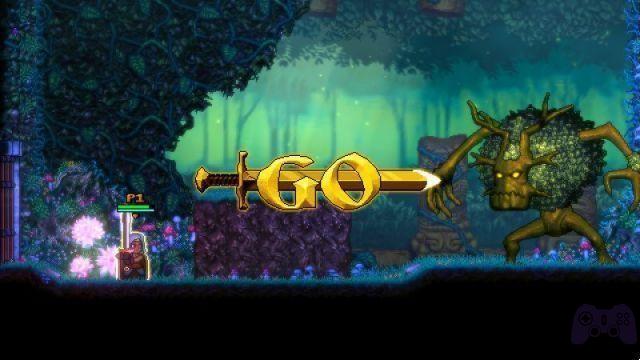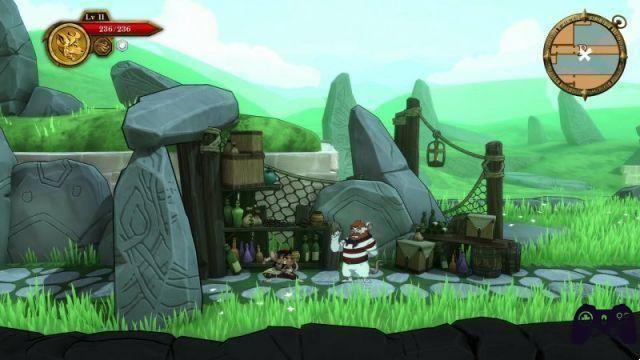Bravery and Greed is a Dungeons and Dragons campaign for 4 friends transformed into a 2D pixel art roguelite dungeon brawler. The art style, characters and settings were designed to evoke a nostalgic gaming atmosphere in those who play, all with very solid architecture and technical features. As with all roguelites, the magic of this game lies in its replayability and, between modifiers and allies to compete with, we can tell you that this game will not bore you.
Developed by Rekka GamesIn Bravery and Greed, a wizard, a paladin, a thief and an Amazon (you can easily imagine them thanks to their respective DnD classes) collect four magical gems from as many dungeons to enter the kingdom of the dwarves and steal their treasure. . During the journey you can choose to ally yourself with one of the four deities of this narrative universe, that of darkness, that of life, that of order and that of chaos. A bit like in Hades with the gods of Olympus, the deeper you go into the four dungeons, the more powerful the gifts of these entities will be.
Where Bravery and Greed differs from the usual fantasy adventure is in the fact that greed is at the center of many mechanics, especially co-op. Gold, potions, and equipment are not shared: at the end of a room, when the chest is opened, first come, first served. Will you be altruistic or will you let greed consume you? In this Bravery and Greed Review We will analyze the 4 classes, the scenarios and the mechanics that make this game a small gem to have fun alone and in company.
Four classes, four styles

The beginning of Bravery and Greed's adventure seems like a joke: a wizard, an Amazon, a thief and a paladin enter a tavern and decide to steal the dwarves' treasure, evidently it is the thief's idea. These are the four characters with which you can venture into the BaG levels alone or in company through the online functions. The Wizard, at first glance, is the most complicated to use: he has a main attack with a medium-short shot, a charged shot that creates a Dragon Ball-style energy ball, and a special ability that transforms his magic wand into a Minion who fights for you. However, with this ability you will lose your main attack, so you must time it well. The paladin has a fairly standard throwing sword and a shield with which to parry blows or charge enemies to send them to the ground and stun them. The Thief is equipped with two very short-range swords, but can rely on a bow and arrows, while the Amazon (the strongest class in our opinion) has a sword and a boomerang that deals a lot of damage if launched with its shot. loaded.
Each character has a life bar and a stamina bar that are consumed with each hit landed and when dodging. The mage has the best dodge because it consists of a small teleport that allows him to pass through enemies. To have the same effect, the other classes must dedicate themselves to darkness and hope that one of the talents they choose is dedicated to this ability. All the characters, however, have a very small window of invulnerability deal damage when dodging, but ends an instant before the end of the animation. Each hero, then, can find equipment in every chest in the dungeons he explores: there are boots, gloves, magic wands with special abilities, and necklaces for passive benefits. The rest of the HUD is made up of potions in your possession that heal a fixed amount of hit points (around 800 or a third of your life) and restore your stamina bar.
Four gods, four power-ups

In Bravery and Greed, building your own setup to face the dangers of each dungeon is really easy. At the beginning of each adventure, after choosing your class, an altar will ask you which of the four deities in the game you want to affiliate with, a choice to which you will have to remain faithful until your death. If you decide devote yourself to the darkness (in our opinion the best combo to complete the game is Amazon + darkness) you will get bonuses and powers that will steal the life of your enemies and give it to you. There are bonuses that increase damage, but only during the first 10 seconds of each room, encouraging an aggressive play style, and power-ups that at the cost of your health points exponentially increase the damage of your weapon, being bad is very good in BaG. Those who decide to follow the path of the divinity of life, however, will receive bonuses that will increase their character's base health, improve dodging, replenish the hero's hit points if he has been injured, and increase the chances of finding potions.
Another really fun set of power-ups is the chaos power-up, which revolves around setting enemies on fire and receiving massive damage bonuses when you're low on health. AND risky but incredibly rewarding and perfectly in line with the mischievous spirit of this game. God of Order's perks are easily the most boring because they only slightly increase damage or mobility while rewarding a consistent, risk-free playstyle. In addition to the gifts you'll receive during your dungeon explorations, you can also find tomes behind an environmental puzzle or after a side room full of enemies. Explore them to receive a passive bonus that will accompany you for the rest of the game. Between the hallways of the procedurally generated maps, there are also merchants where you can purchase potions and equipment, and wizards to upgrade your equipment with additional features.
Tarot and greed

Accumulating gold during an adventure will not only give you access to the riches of merchants but will also be the way in which you will get there. measured progression when you beat the last boss or die trying. Each level will unlock a random resource among the many in-game items. In addition to increasing the chances of finding certain powerful items in a chest, this way you can also unlock a series of tarot cards, that is, passive modifiers to give a little flavor to the game. There is no limit to how many you can activate at the same time and each of them has a negative and a passive effect: mate, for example, will allow you to return to life once you run out of life points, but in the end cost of almost all your gold.
The single-player adventure is a good challenge that requires a bit of training but is ultimately fairly easy to complete. However, where bravery and greed reach their maximum expression is in the multiplayer compartment. With four players allied to defeat enemies but compete for gold, this game is capable of causing a lot of laughter, especially if you are all on the same couch. The controller is practically essential to play, even on PC, where the game, unfortunately, suffers from some technical problems (drastic drop in framerate) when other applications, such as Discord, run in the background. There is also a PvP mode which, however, fails to reach the heights of the PvE adventure dungeons.
Conclusions
Tested version PC with Windows digital delivery Steam, playstation store, Xbox Store Price 15,99 € Holygamerz.com 8.0 Readers (9) 8.3 your voteThe old school look, the precise and dynamic combat system, the greed and frenzy of Bravery and Greed make this game a little pearl. Whether you're alone, on a train (the title seems made especially for the Steam Deck), or on a couch with friends, collaborating and pushing each other so you can grab more gold than others after a fight is an automatic laugh generator. and fun. There's no shortage of ways to fully customize your playstyle between classes, deities, and equipment, and the procedurally generated dungeons are still fun too thanks to their ancient settings between ice caves and enchanted forests. Bravery and Greed only crashes when other applications are active in parallel on the PC but otherwise it is an adventure that will not disappoint.
PRO
- Successful nostalgia factor
- Lots of variety in building your character.
- Fast-paced and fun multiplayer
AGAINST
- Not very successful bosses in single player
- Technical problems on PC






